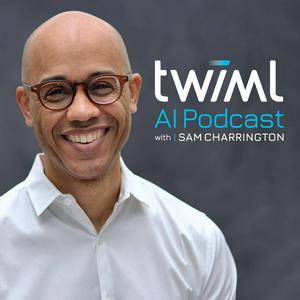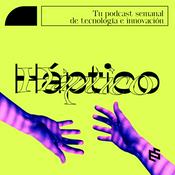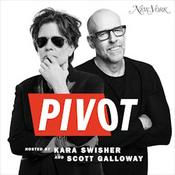780 episodios
- Today, we're joined by Yejin Choi, professor and senior fellow at Stanford University in the Computer Science Department and the Institute for Human-Centered AI (HAI). In this conversation, we explore Yejin’s recent work on making small language models reason more effectively. We discuss how high-quality, diverse data plays a central role in closing the intelligence gap between small and large models, and how combining synthetic data generation, imitation learning, and reinforcement learning can unlock stronger reasoning capabilities in smaller models. Yejin explains the risks of homogeneity in model outputs and mode collapse highlighted in her “Artificial Hivemind” paper, and its impacts on human creativity and knowledge. We also discuss her team's novel approaches, including reinforcement learning as a pre-training objective, where models are incentivized to “think” before predicting the next token, and "Prismatic Synthesis," a gradient-based method for generating diverse synthetic math data while filtering overrepresented examples. Additionally, we cover the societal implications of AI and the concept of pluralistic alignment—ensuring AI reflects the diverse norms and values of humanity. Finally, Yejin shares her mission to democratize AI beyond large organizations and offers her predictions for the coming year.
The complete show notes for this episode can be found at https://twimlai.com/go/761. - Today, we're joined by Nikita Rudin, co-founder and CEO of Flexion Robotics to discuss the gap between current robotic capabilities and what’s required to deploy fully autonomous robots in the real world. Nikita explains how reinforcement learning and simulation have driven rapid progress in robot locomotion—and why locomotion is still far from “solved.” We dig into the sim2real gap, and how adding visual inputs introduces noise and significantly complicates sim-to-real transfer. We also explore the debate between end-to-end models and modular approaches, and why separating locomotion, planning, and semantics remains a pragmatic approach today. Nikita also introduces the concept of "real-to-sim", which uses real-world data to refine simulation parameters for higher fidelity training, discusses how reinforcement learning, imitation learning, and teleoperation data are combined to train robust policies for both quadruped and humanoid robots, and introduces Flexion's hierarchical approach that utilizes pre-trained Vision-Language Models (VLMs) for high-level task orchestration with Vision-Language-Action (VLA) models and low-level whole-body trackers. Finally, Nikita shares the behind-the-scenes in humanoid robot demos, his take on reinforcement learning in simulation versus the real world, the nuances of reward tuning, and offers practical advice for researchers and practitioners looking to get started in robotics today.
The complete show notes for this episode can be found at https://twimlai.com/go/760. - Today, we're joined by Aakanksha Chowdhery, member of technical staff at Reflection, to explore the fundamental shifts required to build true agentic AI. While the industry has largely focused on post-training techniques to improve reasoning, Aakanksha draws on her experience leading pre-training efforts for Google’s PaLM and early Gemini models to argue that pre-training itself must be rethought to move beyond static benchmarks. We explore the limitations of next-token prediction for multi-step workflows and examine how attention mechanisms, loss objectives, and training data must evolve to support long-form reasoning and planning. Aakanksha shares insights on the difference between context retrieval and actual reasoning, the importance of "trajectory" training data, and why scaling remains essential for discovering emergent agentic capabilities like error recovery and dynamic tool learning.
The complete show notes for this episode can be found at https://twimlai.com/go/759. - In this episode, we’re joined by Munawar Hayat, researcher at Qualcomm AI Research, to discuss a series of papers presented at NeurIPS 2025 focusing on multimodal and generative AI. We dive into the persistent challenge of object hallucination in Vision-Language Models (VLMs), why models often discard visual information in favor of pre-trained language priors, and how his team used attention-guided alignment to enforce better visual grounding. We also explore a novel approach to generalized contrastive learning designed to solve complex, composed retrieval tasks—such as searching via combined text and image queries—without increasing inference costs. Finally, we cover the difficulties generative models face when rendering multiple human subjects, and the new "MultiHuman Testbench" his team created to measure and mitigate issues like identity leakage and attribute blending. Throughout the discussion, we examine how these innovations align with the need for efficient, on-device AI deployment.
The complete show notes for this episode can be found at https://twimlai.com/go/758. - In this episode, Zain Asgar, co-founder and CEO of Gimlet Labs, joins us to discuss the heterogeneous AI inference across diverse hardware. Zain argues that the current industry standard of running all AI workloads on high-end GPUs is unsustainable for agents, which consume significantly more tokens than traditional LLM applications. We explore Gimlet’s approach to heterogeneous inference, which involves disaggregating workloads across a mix of hardware—from H100s to older GPUs and CPUs—to optimize unit economics without sacrificing performance. We dive into their "three-layer cake" architecture: workload disaggregation, a compilation layer that maps models to specific hardware targets, and a novel system that uses LLMs to autonomously rewrite and optimize compute kernels. Finally, we discuss the complexities of networking in heterogeneous environments, the trade-offs between numerical precision and application accuracy, and the future of hardware-aware scheduling.
The complete show notes for this episode can be found at https://twimlai.com/go/757.
Más podcasts de Noticias
Podcasts a la moda de Noticias
Acerca de The TWIML AI Podcast (formerly This Week in Machine Learning & Artificial Intelligence)
Machine learning and artificial intelligence are dramatically changing the way businesses operate and people live. The TWIML AI Podcast brings the top minds and ideas from the world of ML and AI to a broad and influential community of ML/AI researchers, data scientists, engineers and tech-savvy business and IT leaders. Hosted by Sam Charrington, a sought after industry analyst, speaker, commentator and thought leader. Technologies covered include machine learning, artificial intelligence, deep learning, natural language processing, neural networks, analytics, computer science, data science and more.
Sitio web del podcastEscucha The TWIML AI Podcast (formerly This Week in Machine Learning & Artificial Intelligence), La Estrategia del Día México y muchos más podcasts de todo el mundo con la aplicación de radio.net

Descarga la app gratuita: radio.net
- Añadir radios y podcasts a favoritos
- Transmisión por Wi-Fi y Bluetooth
- Carplay & Android Auto compatible
- Muchas otras funciones de la app
Descarga la app gratuita: radio.net
- Añadir radios y podcasts a favoritos
- Transmisión por Wi-Fi y Bluetooth
- Carplay & Android Auto compatible
- Muchas otras funciones de la app


The TWIML AI Podcast (formerly This Week in Machine Learning & Artificial Intelligence)
Escanea el código,
Descarga la app,
Escucha.
Descarga la app,
Escucha.





































